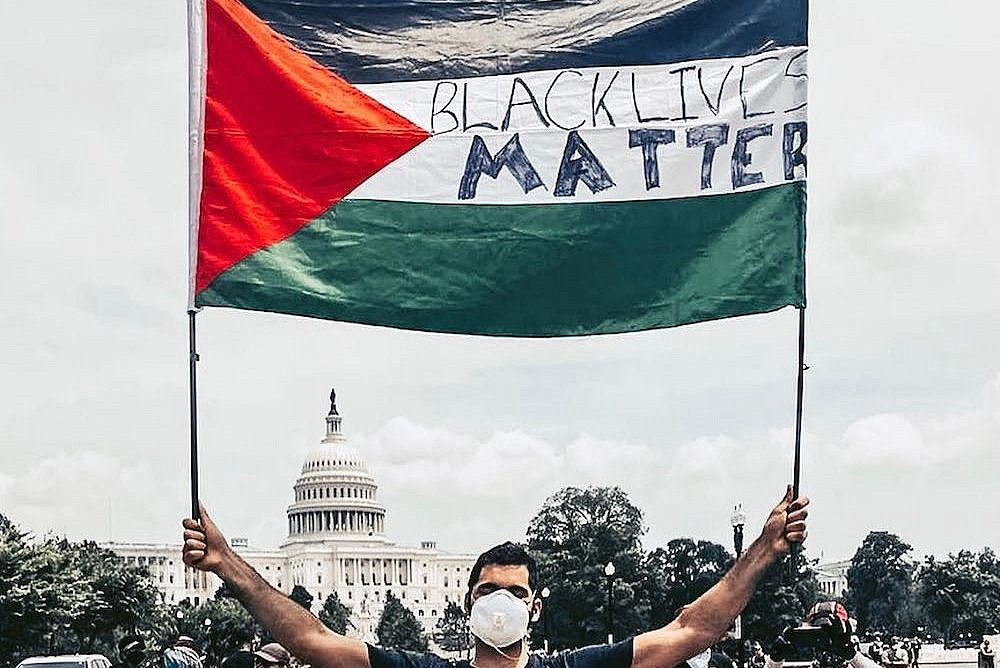On June 6, I was one of 500 law students who marched from the United States Capitol to the White House in solidarity with the Black Lives Matter (BLM) movement. I went wearing my Black Lives Matter t-shirt and bearing a large Palestinian flag that I had inscribed with that same slogan.
Just minutes into the march, one of the organizers paused the growing crowd’s chants. “I want to take a moment to recognize the brother in the front with the Palestinian flag,” he said. “Apartheid is apartheid no matter where it’s occurring, and Israel is participating in that system against the Palestinian people,” he continued. He then led the protesters in chants of “Free Palestine” and “From D.C. to Palestine, racist terror is a crime,” which went on for a couple of minutes.
Most of the people I encountered at the demonstration showed support for what the flag represents: that the systems of oppression targeting Black Americans and Palestinians are interconnected. However, there has also been criticism, particularly among Palestinians, over whether drawing these connections is an effective solidarity tactic in this watershed moment.
Last week in Haaretz, George Zeidan, the Jerusalem-based co-founder of Right to Movement Palestine, argued that while Palestinians may relate to George Floyd’s murder, they must speak out on the struggle of Black Americans without mentioning Palestine to avoid competing narratives. “The analogies certainly deserve attention and are important for both: but not now,” he writes.
Other activists have echoed that position, stating that associating the current uprising against anti-Black racism in the United States with Palestine is opportunistic or even belittling of the BLM movement. “This moment is not about the oppression of Palestinians, and the racism of the Israeli military and police forces. This is the time when we must reach out to the African American communities devastated by US police violence, offering them the support they need and are asking for,” Palestinian scholar-activist Nada Elia stated in Mondoweiss.
I agree — to a certain extent. Appropriating the words of the Movement for Black Lives by chanting “Palestinian lives matter,” for example, distracts from the movement’s message in the same ways that saying “blue lives matter” or “all lives matter” does. Co-opting the movement’s language is self-serving and trivializes its meaning. In this tumultuous, transformative time, we should certainly center the voices, experiences, and demands of Black Americans, and have them take the lead.
But while the phrase “Black Lives Matter” refers to a specific race, the cause has come to represent a much larger, intersectional political agenda. In the movement’s own words, “Black Lives Matter” means to defund the police, invest in Black communities, decriminalize sex work, and have police-free schools. It’s a call for systemic change in our society — one that includes the eradication of racism, fascism, imperialism, and apartheid.
There’s a long history of Black-Palestine solidarity to support this perspective. In 1964, Malcolm X visited the Gaza Strip (under Egypt’s control at the time), and he is rumored to have been one of the first Black American leaders to meet with the Palestine Liberation Organization. Huey Newton, the founder of the Black Panther Party, said: “We support the Palestinians’ just struggle for liberation one hundred percent. We will go on doing this, and we would like for all of the progressive people of the world to join our ranks to make a world in which all people can live.”

Black thinkers and organizers uphold that relationship still today. According to Angela Davis, “Black solidarity with Palestine allows us to understand the nature of contemporary racism more deeply.” Over the past several years, human rights group Dream Defenders has led delegations of Black Americans to Palestine, where they connect with activists fighting for similar causes.
Zeidan writes that this moment should be used as “an opportunity for Palestinians to confront ourselves and our own prejudices, not seek a leading role in the protests and slogans in America.” But why is it an either-or dichotomy? We can and should do both: confront anti-Black racism in our own communities while establishing connections between the different experiences of deadly state violence.
On the issue of whether now is the time to connect Palestinian oppression with that of Black Americans, my answer is this: we cannot afford to wait. Before the signing of the Voting Rights Act of 1965, which prohibited racial discrimination in voting, President Lyndon B. Johnson told Martin Luther King Jr. to wait. It was only following an immense pressure campaign that the president gave in to the demands of the civil rights movement. This is a lesson in how constant pressure, and the demand to be heard now, is the only way forward.
Linking the Palestinian cause with the BLM movement is both crucial and necessary. It is not meant to detract from the movement’s goals, but to complement them — especially considering that the mechanisms of Israeli and American state violence are shared. Highlighting the institutional aspects of racism and injustice, and pointing to their similar manifestations around the world, can help deepen our understanding of the structural racism Black Americans endure. Ultimately, it amplifies both struggles.

